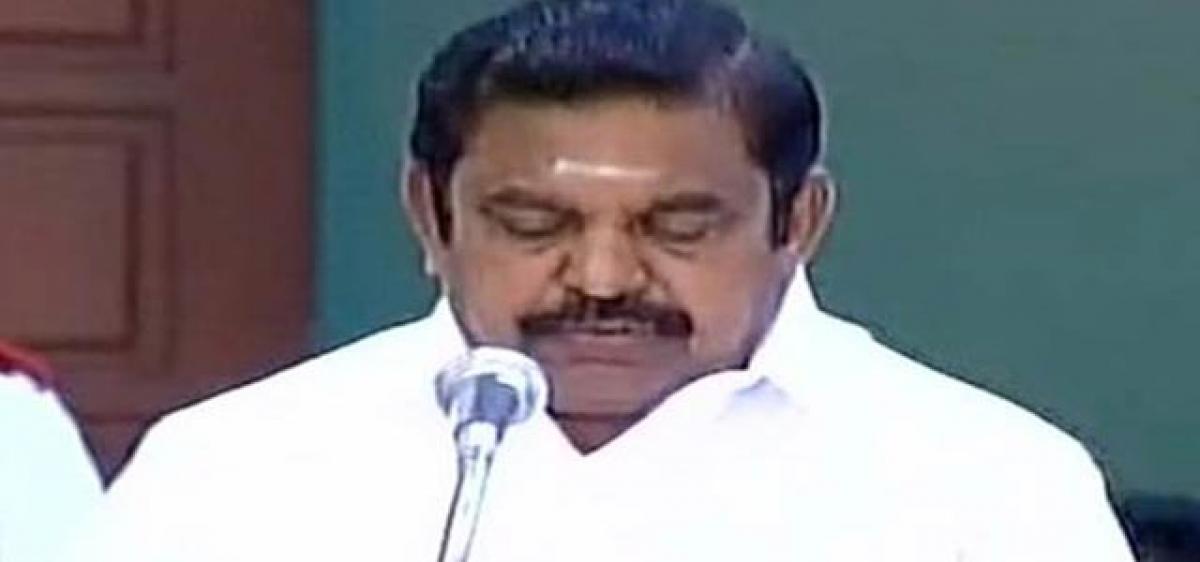Live
- You are freeloader, not students: JNUSU slams VC
- 9 Padma awardees: Burns survivor, disabled achiever, wheel-chair bound educationist awarded
- 36 nominations received on 5th day in YSR district
- TS Inter results 2024 announced, check the results comparison to that of 2023
- Centre seeks info from Singapore on spices ban
- Student murder case: Bike riders create a storm from Bengaluru to Hubballi
- New machine learning models to boost diagnosis of women’s heart disease
- Life comes full circle for pastry chef Nikitha Umesh with ‘Master Chef India Telugu’
- Exploring contrasts in classical dance
- Empowering the workplace through skill enhancement
Just In

One bad apple spoils the barrel, they say. What if we come across these regularly? The ebbing political turmoil in Tamil Nadu could have taken a turn for the worse.
One bad apple spoils the barrel, they say. What if we come across these regularly? The ebbing political turmoil in Tamil Nadu could have taken a turn for the worse. Mercifully, the dilemma of the powers-that-be in control of the situation got confounded with the minority being unable to gather numbers leading to good sense prevailing in the end.
Further delay in this instance would have pushed the state to the brink of President's Rule making a mockery of the democratic process. There is a lesson in this for everyone. Tamil Nadu was about to see a repeat of yet another unwarranted exercise of toppling a democratically elected state government, almost.
Apprehensions arose because of the similar attempts made in the recent past when the Governor's role came under legal scrutiny. Even now the installation of Sasikala-sponsored Palanaisami's government is likely to be interpreted as a defeat of the Centre-backed forces in the State.
Reasons are not far to seek for such a conclusion. The recent happenings of imposition of President's Rule in Uttarakhand and Arunachal Pradesh give room for such trust deficit. The reasons then, as they have been in Tamil Nadu now, are the same: the majority of the ruling dispensation is suspected following the rebellion of a few law-makers and the situation is quickly interpreted as a failure of the constitutional machinery.
This prods the Centre to contemplate imposition of the President's Rule if a friendly government could not be in place. In Democracy, the most sensible way to decide the issue of majority should be a floor test. When it comes to Centre that is what is done and if such tests do not conclusively prove the majority then fresh elections are called for. But, Article 356 of the Constitution gives ample room for its misuse and hence the suspicion.
If, in Tamil Nadu, it is a political battle that someone lost, in the case of Arunachal and Uttarakhand, it was a legal battle that was lost much to the discomfort of the Centre. Consider the case of Bihar too. The Jitan Ram Manjhi experiment backfired on Nitish Kumar, no doubt. But, a similar wading into the troubled waters had not helped the BJP too which sought to encash on Manjhi's vote bank by wooing him.
Its attempt to project Manjhi, a Maha Dalit, as a symbol of neglect of dalits on the whole in Bihar, ignoring the fact that dalit identity-based politics in the state were not so profound as in the neighbouring Uttar Pradesh, led to its electoral defeat.
We have all seen how the TDP government under its patriarch, N T Rama Rao, had to publicly fight back the then Congress when he was unseated. In the North East, it was a common practice through the 80s' and 90's to topple the elected governments.
In 1984, Governor Jagmohan, Indira Gandhi's Man Friday, fired Farooq Abdulla's government similarly as Congress(I) law makers supported a breakaway faction of the ruling party. In democracy, the supreme power of electing and throwing out the governments is vested in the people. Matured politics demand sagacity, not intemperateness!

© 2024 Hyderabad Media House Limited/The Hans India. All rights reserved. Powered by hocalwire.com







